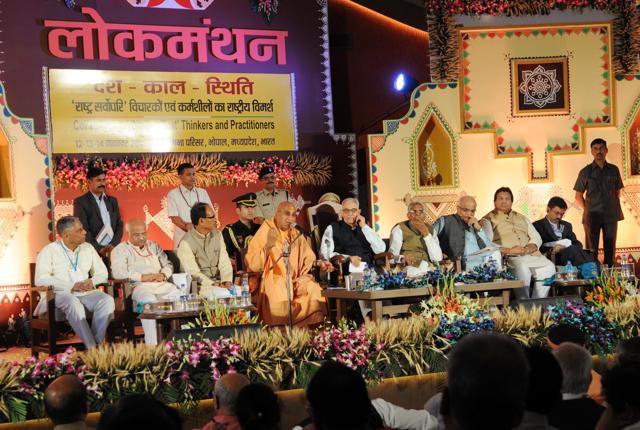Mughals also colonized India, our definition of colonization limited: Indian-American researcher
Rajiv Malhotra, Indian -American researcher and writer of ‘Academic Hinduphobia’ said that it was not just British, but Mughals also who colonized India. He said many people don’t consider Mughals in India as a colonizing force as it was more so at the level of the culture.
Rajiv Malhotra, Indian -American researcher and writer of ‘Academic Hinduphobia’ said here on Saturday that it was not just British, but Mughals also who colonized India. He said many people don’t consider Mughals in India as a colonizing force as it was more so at the level of the culture and they didn’t leave many texts or ‘Mughal Indology’ behind.

Malhotra was speaking in the post-inaugural plenary session of three-day national Lokmanthan that started here on Saturday. The theme of the plenary session was ‘Decolonizing Indian Minds’.
“Our definition of colonization is limited. We don’t think of Mughals as colonizers. It is primarily because of two things. One, it was at the level of culture. Second, Mughals didn’t leave any texts behind in which they had studied India or what we can say Indology texts. Because of these two factors, we don’t consider them as colonizers. But it is a serious issue”, said Malhotra, who is author of books that include The Battle For Sanskrit and Indra’s Net: Defending Hinduism’s Philosophical Unity.
Malhotra spoke how Western indologists have presented a distorted view of India’s history and its contribution. He said the idea of Aryan-Dravidian divide was brought by Europeans in 1800s , due to which India continues to suffer . He said India never bother about what foreigners were researching or writing about it. “China keeps a close watch on researchers who want to study something in China. They demand a copy of the research conducted by foreigners. Every year they conduct a surveillance of the international studies on China. Like, China , we also need to keep a tab on the indologists and come up with our own surveillance of the international studies on India”, he said.
Malhotra, who studied physics and computer science, and served in multiple careers including software development, left his career at 44 to pursue philanthropy and research and set up Infinity Foundation for this purpose in 1994.
Malhotra emphasised that people in India were not decolonized yet. He said indologists were still writing about India from their own lens and vantage point. “There have been five waves or phases of Indology after Independence. We are right now in the fifth wave. The first wave included Marxists, who wanted to start revolution in India through their imported ideology. Second wave included post –colonial studies started by the Left. Third wave included subaltern studies which also started criticism of India. Fourth was post modern studies which stressed there was no grand narrative here. The fifth wave which we are witnessing now is neo-colonization.”, he said.
Stressing on the need to counter the distortion by so called Indologists, Malhotra said he had started a Swadeshi Indology movement by encouraging and supporting young researchers, whom he calls a ‘team of intellectual Kshatriyas (warrior class)’. “It is a collective yagnya which we have to perform to cleanse the air of distortions of history. We have to indulge in intellectual combatism”, said Malhotra.



